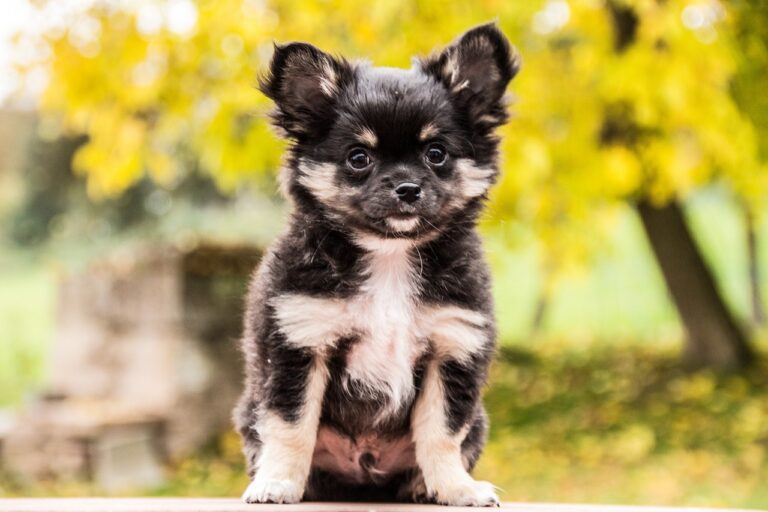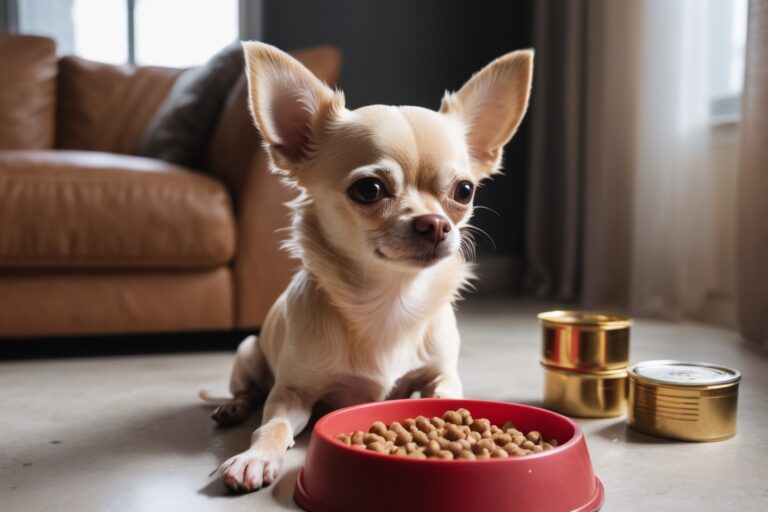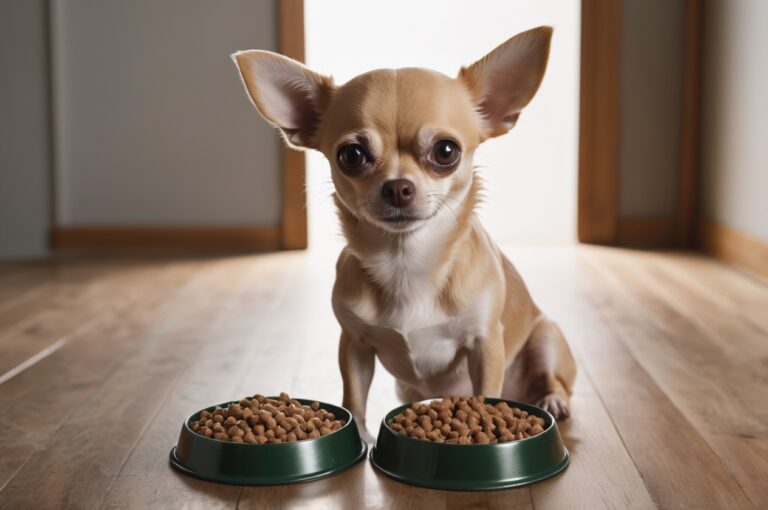How Much Should You Feed Your Chihuahua? A Feeding Schedule Guide
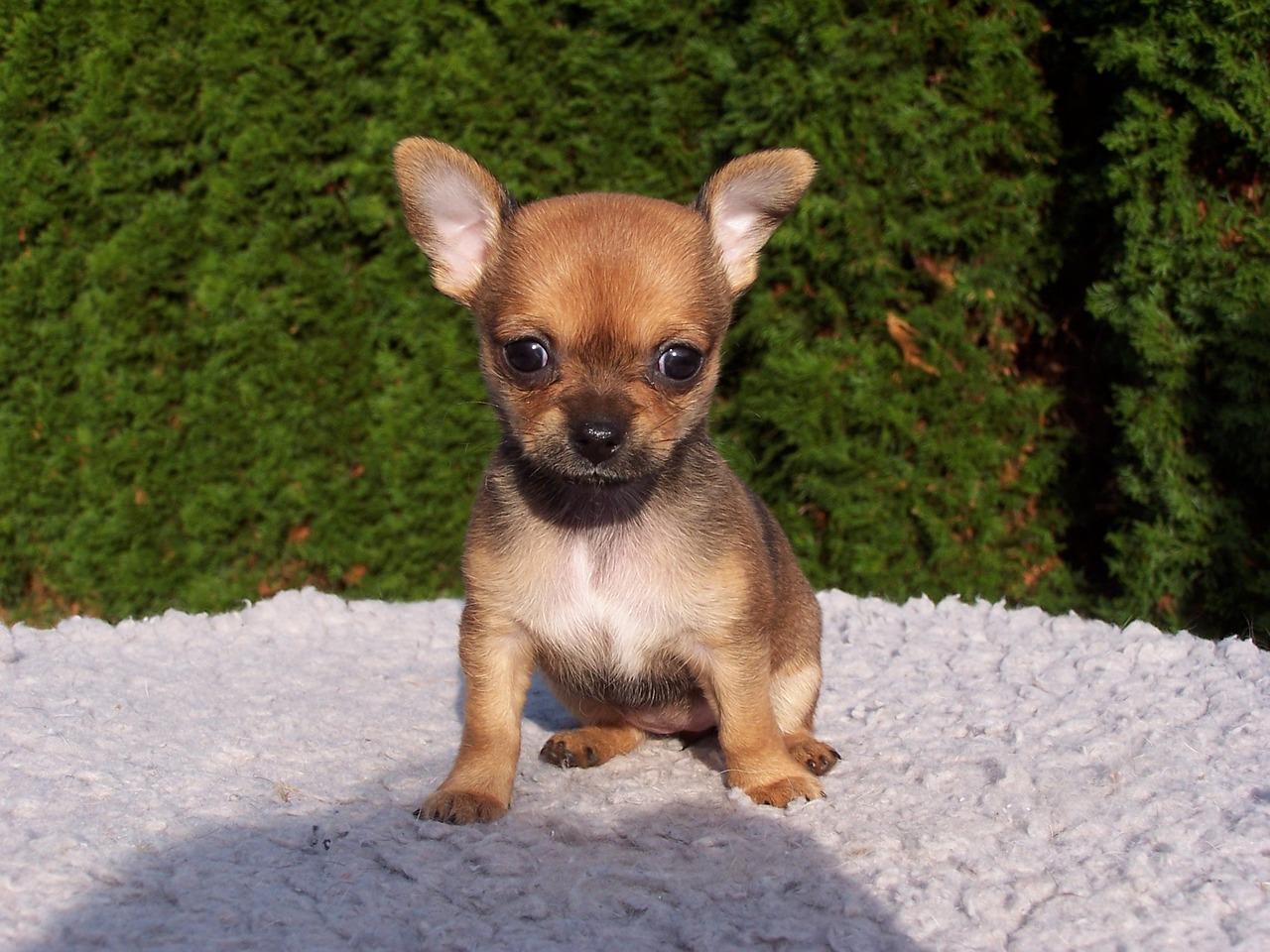
Feeding a Chihuahua the right amount of food is crucial for maintaining their health and preventing issues such as obesity or malnutrition. Due to their small size, it’s easy to overfeed or underfeed them if you don’t understand their specific nutritional needs. This guide will help you determine how much to feed your Chihuahua based on their age, weight, and activity level, and establish a feeding schedule that ensures they stay healthy.
1. Understanding a Chihuahua’s Nutritional Needs
Chihuahuas are small dogs, but their nutritional requirements are still complex. Factors like their weight, age, and activity level all play a significant role in determining how much food they need on a daily basis. It’s important to understand how many calories and what types of nutrients your Chihuahua requires to maintain optimal health.
1.1 Caloric Requirements Based on Size and Age
A Chihuahua’s daily caloric needs vary based on their size, age, and activity level. On average, an adult Chihuahua weighing between 4 and 6 pounds needs approximately 200 to 300 calories per day, depending on how active they are. Puppies and younger Chihuahuas may need more calories to support growth, while senior dogs may require fewer calories due to lower activity levels.
Here’s a general guideline for the number of calories Chihuahuas need at different life stages:
| Life Stage | Weight | Daily Caloric Needs |
|---|---|---|
| Puppy (Under 12 Months) | 2 to 6 pounds | 300 – 400 calories (spread over multiple meals) |
| Adult (1-7 Years) | 4 to 6 pounds | 200 – 300 calories |
| Senior (7+ Years) | 4 to 6 pounds | 150 – 200 calories (depending on activity level) |
It’s important to adjust this guideline based on your Chihuahua’s specific needs. For example, a very active Chihuahua may require slightly more calories, while a sedentary one will need fewer. Always monitor your dog’s weight and adjust portion sizes as needed.
1.2 Balancing Macronutrients: Protein, Fat, and Carbohydrates
Chihuahuas require a balanced diet rich in protein, fat, and carbohydrates to fuel their energy levels and support healthy growth. Here’s a breakdown of what your Chihuahua needs:
- Protein: Essential for muscle development and overall health. Look for dog food with at least 18-22% protein content for adult Chihuahuas and 22-28% protein for puppies.
- Fat: Provides energy and supports a healthy coat. Chihuahuas need 8-15% fat in their diet.
- Carbohydrates: While not essential, carbs provide energy and can aid in digestion. Look for whole grains or vegetables as healthy carbohydrate sources.
In addition to macronutrients, Chihuahuas need vitamins and minerals to support their immune system and overall health. Feeding your dog a high-quality, well-balanced commercial dog food ensures they get all the nutrients they need. For those who prefer a homemade diet, it’s essential to work with a veterinarian or pet nutritionist to create a balanced meal plan.
1.3 Choosing the Right Dog Food
When selecting dog food for your Chihuahua, it’s important to choose a high-quality brand that meets their nutritional needs. Look for foods that list meat (such as chicken or lamb) as the first ingredient and avoid foods that contain fillers like corn or soy. Additionally, consider the life stage of your Chihuahua:
- Puppies: Require food formulated for growth, with higher levels of protein and fat to support development.
- Adults: Need maintenance formulas that provide balanced nutrition for daily energy and health.
- Seniors: Benefit from lower-calorie foods that are easy to digest and support joint and overall health.
You can also opt for grain-free or limited-ingredient dog foods if your Chihuahua has allergies or sensitivities.
2. Feeding Schedules for Different Life Stages

Chihuahuas have different feeding needs depending on their age, with puppies requiring more frequent meals and adults benefiting from a consistent routine. Establishing a proper feeding schedule helps regulate their metabolism and keeps them in good health.
2.1 Feeding a Chihuahua Puppy
Puppies grow rapidly, and they need a steady supply of nutrients to support this growth. From weaning to about 6 months of age, Chihuahua puppies should be fed three to four times a day. By 6 to 12 months, you can transition to feeding them three times a day.
At each meal, ensure you’re providing a portion size that aligns with their caloric needs. Overfeeding can lead to excessive weight gain, even in young dogs, while underfeeding can stunt growth.
Puppies should eat high-quality puppy food designed for small breeds, as it contains the right balance of nutrients to support their development. Once they reach one year old, they can transition to adult dog food.
2.2 Feeding Adult Chihuahuas
For adult Chihuahuas, it’s best to stick to a twice-daily feeding schedule—once in the morning and once in the evening. This consistent routine helps regulate their digestion and metabolism, and prevents overeating or grazing throughout the day.
Make sure to divide their daily caloric needs between these two meals. For example, if your Chihuahua needs 250 calories per day, give them 125 calories per meal. Using a kitchen scale to measure their food ensures accuracy and prevents overfeeding.
Consistency is key when feeding adult Chihuahuas. Maintaining a regular schedule reduces the likelihood of digestive issues, such as upset stomach or bloating, and helps with weight management.
2.3 Senior Chihuahua Feeding Guidelines
As Chihuahuas enter their senior years (typically around 7 years old), their metabolism slows down, and their caloric needs decrease. You may need to adjust their portion sizes and even consider switching to senior-specific dog food that’s formulated to support joint health and digestion.
Senior Chihuahuas should still be fed twice daily, but you may need to reduce the portion size if you notice they are gaining weight or becoming less active. Keeping an eye on their weight and overall health will help you adjust their feeding schedule as needed.
3. Common Feeding Mistakes to Avoid

Feeding your Chihuahua might seem straightforward, but there are several common mistakes that can lead to health issues such as obesity, digestive problems, and nutritional deficiencies. By avoiding these mistakes, you can help ensure your Chihuahua remains healthy and maintains a balanced diet.
3.1 Overfeeding and Obesity Risks
One of the most common mistakes Chihuahua owners make is overfeeding. Due to their small size, it’s easy to give them too much food without realizing it. Overfeeding can quickly lead to obesity, which puts extra strain on their joints and increases the risk of health problems such as diabetes, heart disease, and respiratory issues.
Chihuahuas should have a defined waistline, and their ribs should be easy to feel but not visible. If you notice your Chihuahua gaining weight, it’s crucial to adjust their portion sizes and monitor their calorie intake. Feeding them the correct amount based on their age, weight, and activity level is the key to preventing obesity.
Additionally, avoid feeding your Chihuahua human food or too many treats, as these can significantly increase their calorie intake. Treats should only make up about 10% of their daily calories, so it’s important to factor this into their overall diet.
3.2 Feeding Table Scraps and Treats
Giving your Chihuahua table scraps may seem harmless, but it can lead to poor nutrition and bad eating habits. Human food often contains ingredients that are unhealthy or even dangerous for dogs, such as salt, sugar, and spices. Certain foods like onions, garlic, chocolate, and grapes are toxic to Chihuahuas and can cause serious health issues if ingested.
Even when it comes to safe foods, table scraps can disrupt your Chihuahua’s balanced diet and lead to picky eating. If they get used to receiving scraps from the table, they may start to refuse their regular dog food, which can result in nutrient deficiencies. It’s important to establish clear boundaries and avoid feeding them from your plate.
When giving treats, be sure to choose healthy options that complement their diet. Look for dog treats that are low in calories and made with natural ingredients. You can also use small pieces of fruits and vegetables like carrots or apples as a healthy alternative to commercial treats.
3.3 Ignoring Special Dietary Needs
Another common mistake is ignoring the special dietary needs of your Chihuahua, especially if they have allergies, sensitivities, or medical conditions. For example, some Chihuahuas may develop food allergies to common ingredients like chicken, beef, or grains. If your Chihuahua is showing signs of allergies, such as itchy skin, gastrointestinal issues, or frequent ear infections, it’s important to work with your veterinarian to identify the cause and switch to an appropriate diet, such as a limited-ingredient or hypoallergenic dog food.
Additionally, older Chihuahuas may require special diets that are lower in calories but higher in certain nutrients, such as fiber or joint-supporting ingredients like glucosamine and chondroitin. Ignoring these needs can lead to health issues, so it’s important to adjust their diet as they age.
Chihuahuas with medical conditions like diabetes, kidney disease, or pancreatitis also need tailored diets to manage their health. If your Chihuahua has a medical condition, consult your veterinarian to develop a feeding plan that supports their well-being.
4. Establishing a Healthy Feeding Routine
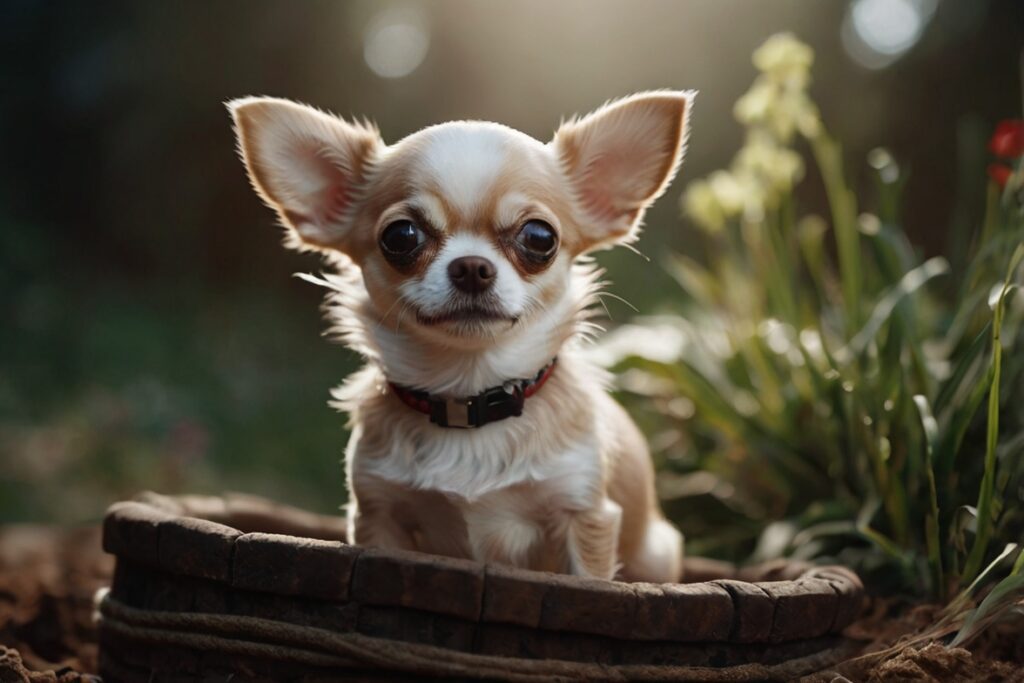
Creating a consistent and healthy feeding routine for your Chihuahua is essential for maintaining their physical and emotional health. A structured routine helps regulate digestion, supports weight management, and reduces the risk of overeating.
4.1 Setting Consistent Meal Times
Chihuahuas thrive on routine, and setting consistent meal times is one of the best ways to support their overall well-being. Feeding your Chihuahua at the same time every day helps regulate their metabolism and digestion, preventing issues like upset stomachs or bloating.
For adult Chihuahuas, feeding them twice a day—once in the morning and once in the evening—is ideal. Puppies may need to eat more frequently, while seniors may benefit from smaller, more frequent meals. Regardless of age, sticking to regular meal times helps prevent grazing throughout the day, which can lead to weight gain.
A consistent feeding schedule also helps your Chihuahua feel secure and can reduce anxiety around mealtime. They’ll learn when to expect food and will be less likely to beg or scavenge for snacks.
4.2 Monitoring Your Chihuahua’s Weight and Adjusting Portions
Regularly monitoring your Chihuahua’s weight is crucial for maintaining a healthy feeding routine. Since Chihuahuas are prone to weight gain, keeping an eye on their body condition allows you to make adjustments to their portion sizes as needed. If you notice your Chihuahua gaining weight, reduce their portions slightly or increase their exercise.
Conversely, if your Chihuahua is losing weight or seems underweight, you may need to increase their food intake or switch to a higher-calorie dog food. It’s also important to adjust portion sizes based on their activity level—more active Chihuahuas will require more calories than less active ones.
Using a kitchen scale to measure your dog’s food ensures accurate portion sizes, preventing overfeeding or underfeeding. You should also check the feeding guidelines on your dog food packaging and adjust based on your dog’s specific needs.
4.3 Hydration and Providing Fresh Water
In addition to proper nutrition, it’s vital to ensure that your Chihuahua stays hydrated. Chihuahuas can be prone to dehydration, especially if they’re very active or if you live in a warm climate. Always provide access to fresh, clean water throughout the day, and consider offering extra water after exercise or outdoor play.
If your Chihuahua isn’t drinking enough water, try switching to a wet dog food or adding a bit of water or low-sodium broth to their kibble to encourage hydration. Proper hydration supports digestion, helps regulate body temperature, and keeps their skin and coat healthy.

